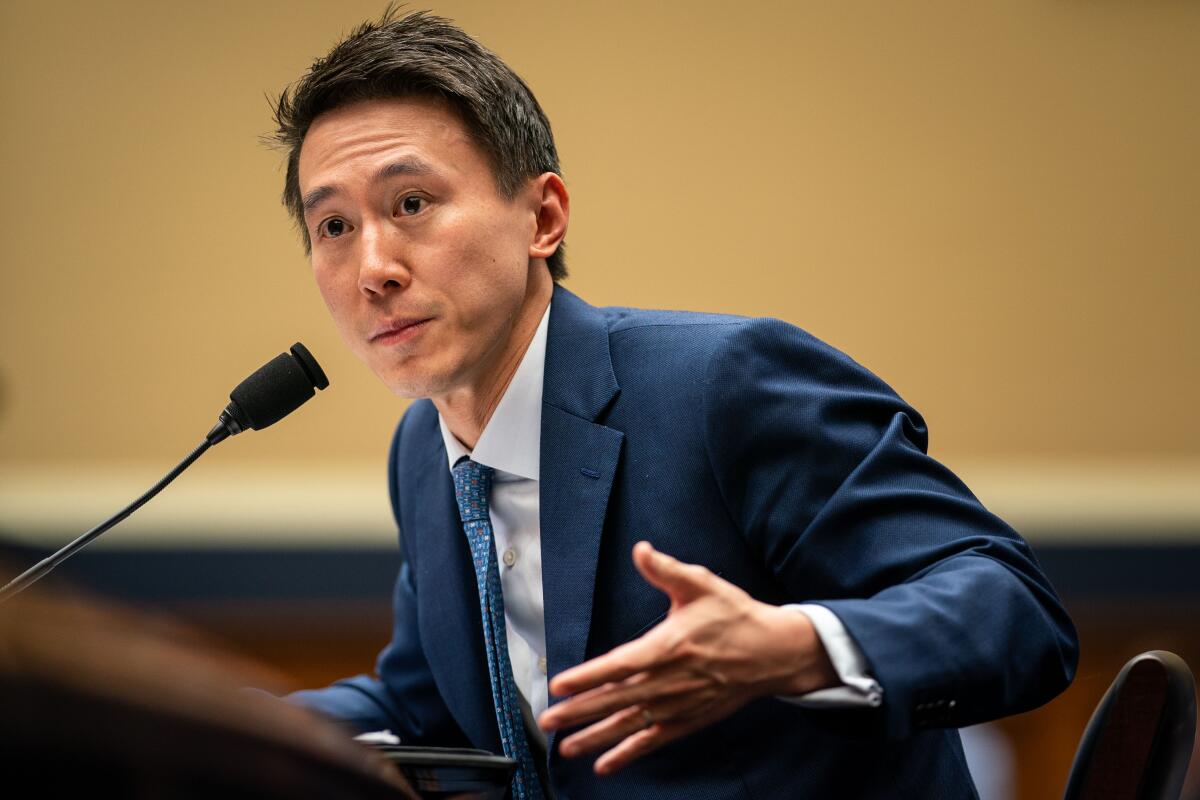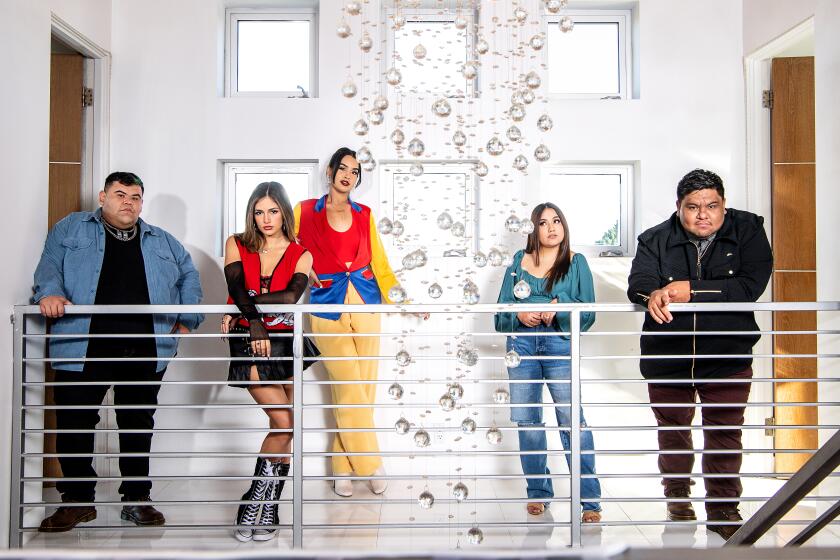TikTok CEO faces bipartisan grilling over privacy, China ties and teens

- Share via
WASHINGTON — TikTok Chief Executive Shou Zi Chew faced a bipartisan baptism of fiery inquiry Thursday at a hearing of the House Energy and Commerce Committee, held as the platform comes under increased scrutiny from lawmakers and the Biden administration.
The questions covered topics as varied as content removal bias against Black creators, election misinformation and the platform’s effects on the mental health of young people, who make up the majority of TikTok’s users. While many of these issues are not unique to TikTok, the Chinese ownership of its parent company, Beijing-based ByteDance, and its ties to the Chinese government make it unique among the major social media platforms popular with Americans.
The five-hour adversarial hearing saw a rare instance of bipartisan cooperation as both Democrats and Republicans raised national security concerns over the possibility of Chinese government officials gaining access to U.S. user data. Lawmakers made references to a 2017 Chinese law that requires companies there to assist state intelligence gathering.
In only a few years, the five young Latinos in the Familia Fuego TikTok collective have gone from working day jobs to mixing with Hollywood’s elite.
“To the American people watching today, hear this: TikTok is a weapon by the Chinese Communist Party to spy on you, manipulate what you see, and exploit [it] for future generations,” Chairwoman Cathy McMorris Rodgers, a Republican from Washington state, said in her opening statement.
Her sentiments were supported by the 52-member committee’s leading Democrat, Frank Pallone Jr. of New Jersey. “While TikTok videos provide a new fun way for people to express their creativity and enjoy the videos of others, the platform also threatens the health, privacy and security of the American people,” he said. “And I’m not convinced that the benefits outweigh the risks that it poses to Americans in its present form.”
In response, Chew, who is Singaporean, gave a robust defense of his company and sought to distance it from the Chinese government. “Let me state this unequivocally: ByteDance is not owned or controlled by the Chinese government. It is a private company,” Chew said in his opening statement.
He added that concerns about addiction and data privacy were an industrywide problem. “We believe what is needed are clear, transparent rules that apply broadly to all tech companies. Ownership is not at the core of addressing these concerns.”
Chew also outlined Project Texas, the company’s proposal to use Austin-based cloud computing company Oracle to vet its code and ensure that U.S. user data are stored in the country and firewalled from access by foreign governments. “This eliminates the concern that some of you have shared with me that TikTok user data can be subject to Chinese law,” Chew told the committee.
But there remains skepticism about the practicalities of that proposal and whether it goes far enough.
“Project Texas just doesn’t pass the smell test. My constituents are concerned that TikTok and the Chinese Communist Party are controlling their data and seeing our own vulnerabilities,” Rep. Angie Craig (D-Minn.) said.
The hearing came after it was reported that the Biden administration plans to force ByteDance to sell its stake in TikTok or face a ban in the United States. Ahead of the hearing, the Wall Street Journal reported that the Chinese government planned to resist the forced sale.
Sam Pocker, known by his handle @FastFoodLegend, is a minor celebrity on TikTok for his avant-garde gross-out videos. But chasing social media stardom comes at a cost.
“If the news is true, China will resolutely oppose it,” Shu Jueting, a spokeswoman at China’s ministry of commerce, said. She added that the sale “would seriously damage investors from multiple countries including China” and hurt “confidence to invest in the United States.”
Ahead of the hearing, a slew of TikTok creators roamed the halls of Congress as part of a public relations effort to urge lawmakers and the Biden administration not to ban the platform, which has 150 million users in the U.S. monthly.
Last month, the White House announced a ban of TikTok on all devices owned by federal agencies. The United Kingdom, Canada and the European Union have also banned TikTok from all government devices, citing security concerns. In 2020, India banned the use of TikTok in the country.
A sobering moment at the hearing came when Rep. Gus Bilirakis (R-Fla.) highlighted the story of a teenager named Chase Nasca, who died by suicide and whose tearful parents were in attendance. “Your company destroyed their lives,” he said.
“The content in Chase’s ‘For You’ page was not a window to discovery, as you boldly claimed in your testimony. … Instead, his For You page was sadly a window to discover suicide,” he said, referring to the curated section of the app for users.
Earlier in the session, Rep. Kat Cammack (R-Fla.) showed a video in which someone appeared to threaten Chairwoman Rodgers with a gun.
“This video has been up for 41 days,” Cammack said. “You expect us to believe that you are capable of maintaining the data, privacy and security of 150 million Americans when you can’t even protect the people in this room? I think that is a blatant display of how vulnerable people who use TikTok are.”
After a recess, Chew said he had communicated with his team to have the video taken down.
The White House has already supported a bipartisan bill in the Senate that would give the Commerce secretary broad new powers, including to ban technology from adversary countries such as China and Russia.









